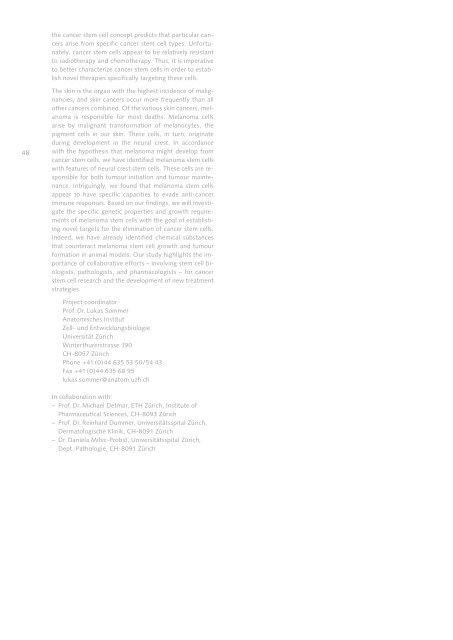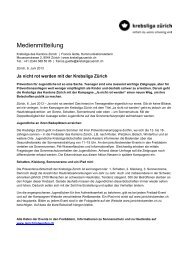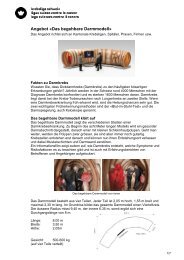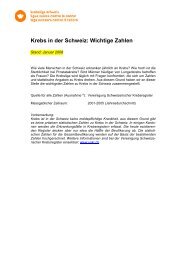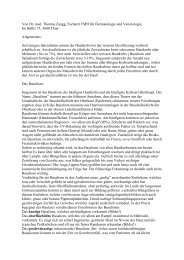Cancer Research in Switzerland - Krebsliga Schweiz
Cancer Research in Switzerland - Krebsliga Schweiz
Cancer Research in Switzerland - Krebsliga Schweiz
Create successful ePaper yourself
Turn your PDF publications into a flip-book with our unique Google optimized e-Paper software.
48<br />
the cancer stem cell concept predicts that particular cancers<br />
arise from specific cancer stem cell types. Unfortunately,<br />
cancer stem cells appear to be relatively resistant<br />
to radiotherapy and chemotherapy. Thus, it is imperative<br />
to better characterize cancer stem cells <strong>in</strong> order to establish<br />
novel therapies specifically target<strong>in</strong>g these cells.<br />
The sk<strong>in</strong> is the organ with the highest <strong>in</strong>cidence of malignancies,<br />
and sk<strong>in</strong> cancers occur more frequently than all<br />
other cancers comb<strong>in</strong>ed. Of the various sk<strong>in</strong> cancers, melanoma<br />
is responsible for most deaths. Melanoma cells<br />
arise by malignant transformation of melanocytes, the<br />
pigment cells <strong>in</strong> our sk<strong>in</strong>. These cells, <strong>in</strong> turn, orig<strong>in</strong>ate<br />
dur<strong>in</strong>g development <strong>in</strong> the neural crest. In accordance<br />
with the hypothesis that melanoma might develop from<br />
cancer stem cells, we have identified melanoma stem cells<br />
with features of neural crest stem cells. These cells are responsible<br />
for both tumour <strong>in</strong>itiation and tumour ma<strong>in</strong>tenance.<br />
Intrigu<strong>in</strong>gly, we found that melanoma stem cells<br />
appear to have specific capacities to evade anti-cancer<br />
immune responses. Based on our f<strong>in</strong>d<strong>in</strong>gs, we will <strong>in</strong>vestigate<br />
the specific genetic properties and growth requirements<br />
of melanoma stem cells with the goal of establish<strong>in</strong>g<br />
novel targets for the elim<strong>in</strong>ation of cancer stem cells.<br />
Indeed, we have already identified chemical substances<br />
that counteract melanoma stem cell growth and tumour<br />
formation <strong>in</strong> animal models. Our study highlights the importance<br />
of collaborative efforts – <strong>in</strong>volv<strong>in</strong>g stem cell biologists,<br />
pathologists, and pharmacologists – for cancer<br />
stem cell research and the development of new treatment<br />
strategies.<br />
Project coord<strong>in</strong>ator<br />
Prof. Dr. Lukas Sommer<br />
Anatomisches Institut<br />
Zell- und Entwicklungsbiologie<br />
Universität Zürich<br />
W<strong>in</strong>terthurerstrasse 190<br />
CH-8057 Zürich<br />
Phone +41 (0)44 635 53 50/54 43<br />
Fax +41 (0)44 635 68 95<br />
lukas.sommer@anatom.uzh.ch<br />
In collaboration with:<br />
– Prof. Dr. Michael Detmar, ETH Zürich, Institute of<br />
Pharmaceutical Sciences, CH-8093 Zürich<br />
– Prof. Dr. Re<strong>in</strong>hard Dummer, Universitätsspital Zürich,<br />
Dermatologische Kl<strong>in</strong>ik, CH-8091 Zürich<br />
– Dr. Daniela Mihic-Probst, Universitätsspital Zürich,<br />
Dept. Pathologie, CH-8091 Zürich


